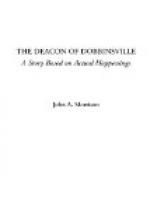Evangelist Blank, himself, led in prayer. His prayer, like himself, was simple, but mighty. It ran something like this:
“O Lord of heaven and earth, we thank thee for this hour. We have come here in thy name; we plead no worthiness and no efficiency of our own. Thy blood and thy grace is all our plea. We would not thrust ourselves into thy holy presence on any human merits. But in thy name and through the blood of Christ our Saviour we come boldly before thee. We praise thee, Lord, for thy great salvation, by which thou dost save us and sanctify us. O Lord, make thyself mighty in the salvation of this people among whom we have come to labor. Let thy matchless power be manifested and thy righteous name be exalted. Be thou lifted up before the people. Lord, we rededicate ourselves at this hour to be used of thee in the salvation of men. Come into these temples of clay afresh at this hour, O Lord, and let the fire of thy holy presence consume all the dross that may be in us. Anoint our feeble lips to speak the unsearchable riches of Christ ... Hear us, Lord, we ask in Jesus’ name. Amen.”
This prayer made a profound impression on the audience. When it was finished, a few other songs were sung, and then Evangelist Blank arose to address the audience. There was something about the preaching and personality of this man that made him a unique figure in the field of preacherdom. In the first place, he was masterful in his knowledge and use of the Holy Scriptures. He knew God’s Book. By patient study and long practice he had brought himself to the place where he could readily bring to his defence an impregnable line of Scriptural proof to sustain the propositions that he held. He was not only proficient in the Scriptures, but he had a thorough training covering the whole range of ministerial and theological thought. He had the happy and unusual combination of those qualities of mind that make for forceful oratory and clearness in theological thought. And last, and far from least, he walked with God. He had a yearning for the lost of earth’s millions.




